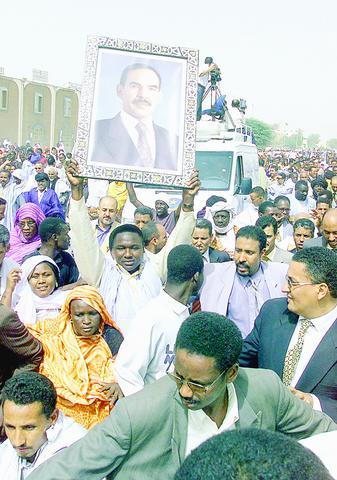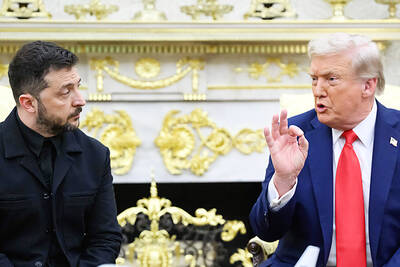Stunned residents of this desert capital emerged from their homes on Tuesday to stare at charred tanks and bullet-pocked buildings after the president said he had crushed a coup attempt by disgruntled military officers.
Armed soldiers patrolled Nouakchott, which was under the control of forces loyal to President Maaouya Sid'Ahmed Ould Taya -- who himself grabbed power in a bloodless 1984 coup. Banks and stores reopened, and buses and taxis circulated.

PHOTO: AFP
"This is the first time that we lived a war," said one man in his 50s, who asked not to be named. "I live close to the presidential palace, and I could hear the sound of guns."
For two days, residents had cowered in their homes as battles raged in the city's sandy, sun-blasted streets. Fighting subsided on Monday afternoon, and Ould Taya went on national television to declare the power grab had been thwarted.
Military officials earlier said that coup plotters had controlled the city's armored detachment, and two scorched tanks stood Tuesday in front of state radio headquarters, near Ould Taya's presidential palace.
Government workers towed other tanks away, still intact.
Bullet and rocket impacts could be seen on the Arab-dominated west African nation's parliament complex and surrounding buildings, including offices of the national carrier, Air Mauritania.
Nouakchott's international airport remained closed. Witnesses said that tanks and rocket launchers could be seen on the tarmac.
By late afternoon, hundreds of government supporters had massed in the streets near the presidential palace, shouting slogans and waving signs.
"We're a country that's advancing, if slowly, even though there remains many things that we need to achieve," said a middle-aged businessman, Ahmed Hamza. "What just happened is unacceptable."
In Washington, the US said it welcomed the failure of the power grab.
"We are pleased the attempted coup has failed and that President Taya has regained control," State Department spokesman Philip Reeker said.
A 34-member US military assessment team has arrived in the city to augment security at the American embassy and help in case its nationals are evacuated, Reeker said.
The coup attempt was the most serious threat to Ould Taya's government since he came to power in his own military takeover. He was confirmed as president in 1992 and 1997 elections that were widely viewed as flawed.
The uprising followed a crackdown on Islamic activists. Ould Taya's pro-West government has a reputation of muzzling dissent, by censoring the media or by randomly arresting opposition leaders.
One military official, speaking on condition of anonymity, blamed the coup attempt on a cabal led by former and current mid-ranking Army officers.
Twelve alleged coup plotters were under arrest, the official said, including two majors he identified as the ringleaders: Mohamed Ould Hanana, who was dismissed from the military two years earlier; and Mohamed Ould Sheikna, a current officer who was lightly injured during the fighting, he said.
Authorities were seeking to make other arrests in the attempted power grab, the official said.
Army Chief of Staff Mohammed Lamine Ould N'Deyane was killed by coup forces when he refused to join their ranks, he said.
It was not clear how many other people died in the uprising.
Staff at Nouakchott's main hospital said they received six bodies, three men in uniform and three civilians. They also treated 37 wounded, including two children, all of whom had been released.
Mauritania's government has moved against Islamic activists since the US-led Iraq war, initially to try to prevent any shows of support for Saddam Hussein.
Dozens of Islamic leaders were arrested last month for allegedly using mosques and sevret meetings to recruit fighters. Ould Taya's pro-West government has a reputation of muzzling dissent, by censoring the media or by arresting opposition leaders.

Shamans in Peru on Monday gathered for an annual New Year’s ritual where they made predictions for the year to come, including illness for US President Donald Trump and the downfall of Venezuelan President Nicolas Maduro. “The United States should prepare itself because Donald Trump will fall seriously ill,” Juan de Dios Garcia proclaimed as he gathered with other shamans on a beach in southern Lima, dressed in traditional Andean ponchos and headdresses, and sprinkling flowers on the sand. The shamans carried large posters of world leaders, over which they crossed swords and burned incense, some of which they stomped on. In this

Near the entrance to the Panama Canal, a monument to China’s contributions to the interoceanic waterway was torn down on Saturday night by order of local authorities. The move comes as US President Donald Trump has made threats in the past few months to retake control of the canal, claiming Beijing has too much influence in its operations. In a surprising move that has been criticized by leaders in Panama and China, the mayor’s office of the locality of Arraijan ordered the demolition of the monument built in 2004 to symbolize friendship between the countries. The mayor’s office said in

‘TRUMP’S LONG GAME’: Minnesota Governor Tim Walz said that while fraud was a serious issue, the US president was politicizing it to defund programs for Minnesotans US President Donald Trump’s administration on Tuesday said it was auditing immigration cases involving US citizens of Somalian origin to detect fraud that could lead to denaturalization, or revocation of citizenship, while also announcing a freeze of childcare funds to Minnesota and demanding an audit of some daycare centers. “Under US law, if an individual procures citizenship on a fraudulent basis, that is grounds for denaturalization,” US Department of Homeland Security Assistant Secretary Tricia McLaughlin said in a statement. Denaturalization cases are rare and can take years. About 11 cases were pursued per year between 1990 and 2017, the Immigrant Legal Resource

‘RADICALLY DIFFERENT’: The Kremlin said no accord would be reached if the new deal with Kyiv’s input did not remain within the limits fixed by the US and Russia in August Ukrainian President Volodymyr Zelenskiy is to meet US President Donald Trump in Florida this weekend, but Russia on Friday accused him and his EU backers of seeking to “torpedo” a US-brokered plan to stop the fighting. Today’s meeting to discuss new peace proposals comes amidst Trump’s intensified efforts to broker an agreement on Europe’s worst conflict since World War II. The latest plan is a 20-point proposal that would freeze the war on its current front line, but open the door for Ukraine to pull back troops from the east, where demilitarized buffer zones could be created, according to details revealed by